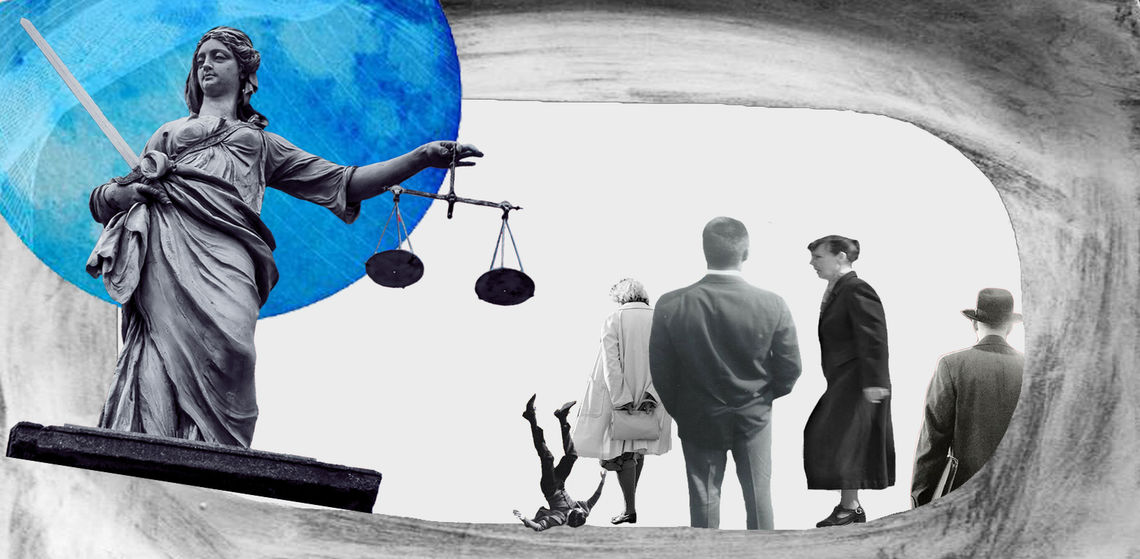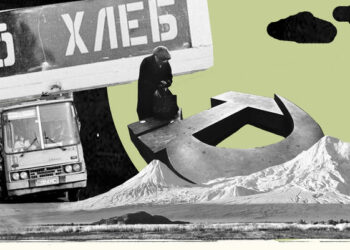
Illustration by Roubina Margossian.
Human Rights Day is observed on December 10 every year to celebrate the adoption of the Universal Declaration of Human Rights (UDHR) by the United Nations. Armenia has also acceded to the European Convention on Human Rights (ECHR), becoming a signatory on January 25, 2001, the same day it became a full member of the Council of Europe. The Convention was ratified by Armenia and it came into force on April 26, 2002. While the UDHR is not legally binding, the ECHR is guaranteed by the European Court of Human Rights (ECtHR), to which a plaintiff can apply after exhausting all domestic avenues for appeal.
The first such applications started coming in the very first year; there were seven complaints made against Armenia in 2002. These numbers grew in subsequent years, with the high marks being 2007 (614) and 2016 (753).
However, cases at the ECtHR take years to come to completion. The first five ECtHR verdicts against Armenia were adopted in 2007. A total of 137 verdicts against Armenia have been adopted from 2007-2020. The most were in 2012 (16), 2018 (16), and 2019 (20). There have been sporadic calls to recall the judges in Armenia, whose verdicts have been overturned by the ECtHR and resulted in financial penalties to the state budget.
Below are some of the ECHR-guaranteed rights that Armenia has been found to have violated in the past. It should be pointed out that there are cases in which the court has recognized that multiple rights were violated. For example, the right of a fair trial (Article 6 of the Convention) was often found to have been violated in conjunction with other violations.
Right to Life (Article 2)
On the evening of September 7, 2007, a 22-year-old pregnant woman lost consciousness, followed by seizures. The ambulance arrived about 40 minutes later. The doctor diagnosed a convulsion syndrome and gave her two injections; she was transferred to hospital. A week later, she died in hospital without regaining consciousness. Neither the doctor, the nurse nor the ambulance driver helped the family bring the pregnant, unconscious woman down from the eighth floor and into the ambulance. Moreover, on the journey to the hospital, the doctor preferred to sit up front, rather than next to the unconscious patient in the back.
The conclusion of the forensic medical examination mentioned that the professional actions of the ambulance brigade were adequate and no criminal proceedings were initiated due to the lack of corpus delicti. After exhausting all domestic appeal processes, the deceased woman’s father, Albert Movsesyan, applied to the ECtHR.
In the case Movsesyan v. Armenia, the ECtHR found that there had been a procedural violation of Article 2 of the Convention (Right to Life) and set €12,000 as compensation for non-pecuniary damages.
There have been seven verdicts against Armenia based on violations of Article 2. Four of these cases referred to deaths registered within the army.
Prohibition of Torture (Article 3)
On April 23, 2004, Grisha Virabyan, a political activist and protest participant, was taken to a police station on suspicion of carrying firearms. He was severely beaten and, after being kept overnight, was transferred to hospital for surgery. An excerpt from Virabyan’s testimony reads:
“Then H. hit me… He was hitting me with the sharp pointed tip of his shoe. I felt a sharp pain in my rib area. He suddenly hit me twice with his left fist. I lost my patience at that stage and, in self-defence, picked up the cell-phone charger on the desk and hit him with it. The charger head flew off and hit H. in the face, while the cable remained in my hand. I saw that he clasped his eye and yelled. Just then, A. entered the room and, seeing the chaotic situation, took me to a nearby room. H. and another police officer followed A. there and began to beat me. I fell, but they continued to beat me. They were punching and kicking me. Then other police officers came and took H. and A. out. I would like to point out that, from the start, they were both kicking my testicles. Sometime after they were removed, another police officer A.K. entered the room and started swearing at me, trying to humiliate me, and even spat on me twice and struck my testicles. He then struck my legs several times and left. Before leaving, he struck my testicles again with his keys.”
Article 3 of the Convention states that no one may be tortured or treated in an inhuman or degrading manner. In the case of Virabyan v. Armenia, the ECtHR found that there had been a significant violation of Article 3 of the Convention (the person had been tortured) and also a procedural violation (the state bodies had not conducted an effective investigation into the applicant’s allegations of ill-treatment).
In its 2012 verdict, the ECtHR set a sum of €25,000 for non-pecuniary damages and €6,000 as reimbursement for court costs.
There have been 16 decisions made against Armenia based on violations of Article 3. In two particularly scandalous cases, Zalyan v. Armenia and Nalbandyan v. Armenia, citizens were mistreated by law enforcement in order to extort more testimonies.
Right to Liberty and Security (Article 5)
In ECtHR verdicts against Armenia, one of the most predominant violations refers to Article 5 and its different points. This Article states that no one can be deprived of their liberty illegally. A set of cases concern the events of March 1, 2008, and the deprivation of individuals’ liberty by law enforcement officers during the post-presidential election period amid protests.
For example, in the case of Ayvazyan v. Armenia, the applicant was arrested on March 1, 2008, in Yerevan’s Freedom Square, when police were dispersing protesters. After his arrest, he was accused on March 4 of using violence against police officers and was later sentenced to 1.5 years in prison. Prior to the verdict, however, detention was chosen as a precautionary measure against him. After appealing the decisions on detention in domestic courts (to no avail), Ayvazyan applied to the ECtHR. The ECtHR found that there had been a violation of Article 5 of the Convention (Right to Liberty and Security), and set €4,500 compensation for non-pecuniary damages.
Right for Respect for Private and Family Life (Article 8)
Article 8 of the Convention provides for the right for respect for private and family life. There have been four verdicts against Armenia based on violations of Article 8.
In the case of Hambardzumyan v. Armenia, Karine Hambardzumyan was the deputy chief of the women’s unit of the Abovyan correctional facility in 2010. A prisoner in that precinct reported to police that Hambardzumyan had demanded a bribe in exchange for more favorable treatment. In response, police obtained court approval to initiate operative investigation measures, specifically permission to film and record for one month. However, the court order did not specify against whom the measures should be taken.
Police covertly recorded the conversations of Hambardzumyan and the convict about the exchange of money and were able to videotape the moment the transfer was made. Hambardzumyan was charged on the basis of this evidence, and later sentenced to nine years in prison. During the case in the Armenian courts, Hambardzumyan and her lawyer moved to dismiss the secret recordings and videos as inadmissible evidence, because the court decision permitting them did not specify against whom the measures should have been taken.
The ECtHR found that there had been a violation of Article 8 of the Convention in this case, and set €1,200 in compensation for non-pecuniary damages.
Freedom of Thought, Conscience and Religion (Article 9) and Freedom of Expression (Article 10)
Complaints against violations of the freedom of thought, conscience and religion (Article 9) are mainly launched by members of religious organizations against their duty to serve in the army.
There have been two successful complaints against violations of the freedom of expression, in the cases of Meltex Ltd and Mesrop Movsesyan v. Armenia and Dareskizb Ltd v. Armenia. The first was the widely-publicized case of the A1+ television company being deprived of air time, and the second concerned the prohibition of printing the March 4, 2008 issue of the Armenian Times daily newspaper (operated by now-Prime Minister Nikol Pashinyan’s family).
Freedom of Assembly and Association (Article 11)
Article 11 of the Convention states that everyone has the right to take part in peaceful assemblies and join associations. This includes the right to set up a trade union and the freedom to join one. There have been 13 verdicts against Armenia for violations based on this Article. Most of the cases concern opposition rallies following the 2008 presidential election.
For example, in the case of Ter-Petrosyan v. Armenia, the Court noted that the dispersal of the protest in Freedom Square had been carried out without sufficient justification, using disproportionate force.
Protection of Property (Article 1, Protocol 1)
The right of protection of property is enshrined in Article 1 of Protocol 1 of the Convention. There are over 20 verdicts against Armenia based on this Article.
For example, in the case of Papoyan v. Armenia, the ECtHR recognized the violation of the right of protection of property and the right to a fair trial, and set €3,600 in compensation for non-pecuniary damages. In the case, the government had adopted a decision to expropriate tracts of real estate situated within the central Kentron district of Yerevan. Margarita Papoyan had a small kiosk in that area, which was demolished by state authorities. The mayor of Yerevan adopted a decision granting her the right to rent five square meters of public land in the given area for seven years, in order to build and operate a kiosk. However, the Yerevan authorities never actually signed a lease, and later suggested that Papoyan choose another plot of land to rent.
By upholding the essential human rights guaranteed by the ECHR, the jurisdiction of the ECtHR acts as an accountability measure against even the highest domestic courts of European states. In addition to protecting the rights and freedoms of individuals, it also obliges states to reform their domestic legislation and legal practices.
New on EVN Report
Healing War Trauma With Art Therapy
A new program is implementing art therapy classes to help children in one of Armenia’s poorest regions cope with the trauma of war and process the barrage of negative news and feelings.
Read moreFrom Sochi to Brussels: Challenges and Opportunities
As Armenia works to rebuild its positions following the 2020 Artsakh War, it must assess the challenges, threats and risks of the security environment and clarify a position that reflects state and national interests.
Read moreNow Is the Time to Follow Aram Manoukian’s Path
Are Armenians doomed to endure the contemptuous kleptocracy of the “old” and the cynical defeatism of the “new”? Gaidz Minassian proposes an alternate vision, one that was conceived of by Aram Manoukian over a century ago.
Read moreThe Endless Geopolitical Struggle
Western attempts to infiltrate into the sphere of Russian influence have meant to weaken Russia and maintain constant tension. Could this result in larger clashes with more unpredictable consequences, this time between large geopolitical players?
Read moreHow to Avoid a Deadlock or the Use of Force During the Delimitation of the Armenian-Azerbaijani Border?
In light of Azerbaijan’s aggressive military operations, the international community’s response and the formation of a format for the delimitation and demarcation process, Sossi Tatikyan offers comprehensive suggestions on potential formats and phases.
Read more





